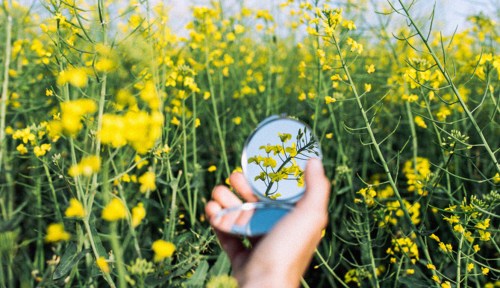Content warning: This story contains references to restrictive eating practices, which may be upsetting or triggering for some readers.
Experts in This Article
board-certified dermatologist and founder of FACET Dermatology
licensed psychotherapist in New York City
As a dietitian, I’m in the business of helping people improve their health, but just like everyone else, I also contend with negative self-talk. For me, it’s my acne-ridden skin. For years, I was plagued with thoughts about how people perceived me: Will people think I’m credible when my skin looks like this?
I’ve had acne since puberty and have done. It. All. to find a solution to my skin issues. After trying a smattering of medications and topical treatments—some with very harsh side effects—I decided to go the anti-acne diet route. Surely, if I found the right diet, my skin would clear up, I thought. I’m a dietitian, after all.
In the name of clear skin, I restricted gluten, carbs, dairy, sugar, legumes, coffee, and seed oil. But instead of gaining a glowing, perfect complexion, I ended up with disordered eating. I started seeing food as the enemy. As if acne wasn’t hard enough on my mental health, the rabbit trail of elimination diets made it worse.
Fortunately, I’ve worked through those difficult emotions and have become an intuitive eater. Part of that journey was accepting my skin. Ahead, I talked to a dermatologist and psychotherapist to dive into the complex intersection of skin, diet, and mental health.
How acne affects mental health
For most people, acne develops during puberty—a period marked with immense hormonal, physical, and emotional changes. These big changes can also affect your skin.
Lea Schupak, LMHC, a licensed psychotherapist in New York City, explains, “Acne usually begins in puberty, a time when many people start to struggle with body image and how they present themselves to the world. It’s a time of hormonal upheaval, and the body and brain begin to undergo strong and disruptive shifts. But it’s also a time when it’s more socially accepted and expected to have imperfect skin. However, many women continue to struggle with acne well into their 20s and 30s.”
In other words, acne during the teenage years is written off as a normal hormonal occurrence. But when you have acne as an adult, it’s often assumed you are to blame. “This can greatly affect self-esteem,” Schupak says, and it’s likely a battle people with adult acne spend many years fighting, “bringing on an additional layer of despair and shame.”
Shame is what I felt, alright. My poor diet choices were causing my skin problems, I told myself, and if I could only get my act together, I’d have good skin. So I covered my skin with a thick layer of makeup and scrutinized every ingredient that crossed my lips. It’s no surprise that those with acne are more likely to have anxiety, depression, and stress, according to a January 2023 review in Cureus1.
“Many struggle with feeling accepted, especially if none of their friends or peers have similar issues with their skin. It brings on feelings of isolation and insecurity that can be very difficult with which to cope, especially in a society that is aesthetically driven and puts on tremendous amounts of pressure to look a certain way,” Schupak says.
“Embracing the texture of my skin, the scars, and the breakouts has made me a more empathetic nutrition practitioner. No one is immune to self-image issues.”
Can following an anti-acne diet really give you clear skin?
You’ve probably heard that the state of your skin reflects what is happening inside your body. Some research shows that your diet can affect your skin, and in particular, low-glycemic foods (AKA, foods that don’t tend to spike blood sugar, like high-fiber veggies, beans, and whole grains) have been linked to less acne, per the American Academy of Dermatology (AAD). For example, people with acne who consumed more low-glycemic foods had fewer skin issues compared to those with high-glycemic diets in an August 2020 review in the American Journal of Clinical Dermatology2.
“Studies show that an increased intake of omega-3 fatty acids (which can be found in fatty fish and fish oil, nuts and seeds, and plant oils) can help, as can focusing on a low-glycemic diet,” says Geeta Yadav, MD, a board-certified dermatologist and founder of FACET Dermatology. “Low-glycemic index foods include green vegetables, most legumes, and avocado; it is thought that these foods’ effects on blood sugar play a role in reduced acne.”
It’s worth noting, though, that some studies have not shown a connection between high-glycemic diets and acne, per the AAD, so more research is needed in this area.
In addition, dairy may be more likely to exacerbate acne. “There is a correlation between lower dairy intake and clearer skin,” Dr. Yadav says. Eating dairy and other highly processed carbohydrates can lead to fluctuating insulin levels3 and insulin-like growth factor (IGF)-1. This in turn may increase oil production and subsequent breakouts. Some studies have found only a link between acne and milk4, but no significant link between yogurt and cheese.
According to the AAD, we need more research around food and acne before we can draw any firm conclusions. Especially because what works for one person may not work for another. That’s why the AAD recommends paying attention to your breakouts and noting whether certain foods or drinks seem to trigger or worsen your acne.
And keep in mind: Diet isn’t the only thing that causes breakouts. “There’s much more to acne than diet. Everything from hormones and genetics to fungal infections and dirty clothing/bedsheets can play a role,” Dr. Yadav says.
Here’s the bottom line, and what I’ve learned through my journey: What you eat may affect your skin, but that doesn’t mean you need to fear certain foods—especially because foods like milk and higher-glycemic produce like potatoes are highly nutritious. Rather than taking numerous foods out of your diet, you can add nourishing foods instead. Ramp up your veggie and fruit intake. Eat fish a couple of nights per week. Add nuts to your snack rotation.
For a while, I put all my stock in restrictive dieting and “clean eating,” but as I’ve learned, following sweeping and unfounded diet recommendations can be more harmful than good. The more foods I cut out, the more my eating became disordered. (This is how some eating disorders start5, with dieting and body dissatisfaction.)
Finally, though, I healed my relationship with food by learning to accept my skin.
Tips to help you accept your skin
In the middle of a breakout, it’s easy to focus on the negative. So how can you learn to accept your skin? Schupak has some tips on how to deal with the heavy emotions that come along with acne.
- Pause and reflect: Back away from the mirror! “If skin becomes a fixation or brings on overwhelming feelings of sadness, anxiety, or isolation, it’s good to take a step back and try to understand what’s at the root of this [emotion],” she suggests. Is it just your acne bothering you, or is there a deeper issue at play?
- Journal your thoughts: We know that journaling is helpful for several things, including mental health6. “I encourage my clients to get a journal and start exploring the unconscious messages that they have received and internalized about what skin should look like,” she says.
- Evaluate your associations with skin: What are the deep-seated issues? “I ask my clients, ‘What comes up for you when you hear the word skin? What are your associations with ‘skin’ or ‘acne’? What comes to mind when you hear those words?’ Perhaps you heard an aunt make unkind remarks about somebody else’s acne, and therefore have internalized the message that acne is intolerable. There is always more to the story.”
- Consider your whole self: Focus on your body’s abilities and accomplishments. “Isolating the ‘problem’ area only brings on further distress and obsessiveness, but if we look at ourselves as a whole, we can see that there is a lot more to us than skin imperfections,” Schupak says.
- Practice mindfulness: Awareness activities like yoga, meditation, and breathwork may be helpful. “Engage in a mindfulness activity to ground yourself and connect to a deeper part of yourself. Mindfulness-based activities are clinically proven to reduce anxious thinking7 and promote self-compassion.”
I had to temporarily pause my skin health efforts and prioritize healing my relationship with food. It didn’t happen overnight. The quest to become comfortable with my skin has been years in the making. But it has been worth it.
Embracing the texture of my skin, the scars, and the breakouts has made me a more empathetic nutrition practitioner, and I’ve realized that no one is immune to self-image issues. Food and self-acceptance are profoundly connected, and my journey allows me to help others who are struggling in this area.
If you or someone you know is struggling with an eating disorder, call the National Alliance for Eating Disorders Helpline at 1-866-662-1235 for immediate support or go to allianceforeatingdisorders.com or anad.org/get-help for more resources.
Almutawa, Yaser Mansoor et al. “Evaluation of Psychiatric Comorbidities and Quality of Life As Well As Brain-Derived Neurotrophic Factor (BDNF) Concentrations Among Patients Suffering From Acne Vulgaris: A Systematic Review and Meta-Analysis.” Cureus vol. 15,1 e33357. 4 Jan. 2023, doi:10.7759/cureus.33357
↩︎Baldwin, Hilary, and Jerry Tan. “Effects of Diet on Acne and Its Response to Treatment.” American journal of clinical dermatology vol. 22,1 (2021): 55-65. doi:10.1007/s40257-020-00542-y
↩︎Guertler, Anne et al. “Dietary Patterns in Acne and Rosacea Patients-A Controlled Study and Comprehensive Analysis.” Nutrients vol. 15,20 4405. 17 Oct. 2023, doi:10.3390/nu15204405
↩︎Aghasi, Mohadeseh et al. “Dairy intake and acne development: A meta-analysis of observational studies.” Clinical nutrition (Edinburgh, Scotland) vol. 38,3 (2019): 1067-1075. doi:10.1016/j.clnu.2018.04.015
↩︎Horovitz, Omer, and Marios Argyrides. “Orthorexia and Orthorexia Nervosa: A Comprehensive Examination of Prevalence, Risk Factors, Diagnosis, and Treatment.” Nutrients vol. 15,17 3851. 3 Sep. 2023, doi:10.3390/nu15173851
↩︎Chilicka, Karolina et al. “Microbiome and Probiotics in Acne Vulgaris-A Narrative Review.” Life (Basel, Switzerland) vol. 12,3 422. 15 Mar. 2022, doi:10.3390/life12030422
↩︎Sohal, Monika et al. “Efficacy of journaling in the management of mental illness: a systematic review and meta-analysis.” Family medicine and community health vol. 10,1 (2022): e001154. doi:10.1136/fmch-2021-001154
↩︎Ter Avest, M J et al. “Interplay between self-compassion and affect during Mindfulness-Based Compassionate Living for recurrent depression: An Autoregressive Latent Trajectory analysis.” Behaviour research and therapy vol. 146 (2021): 103946. doi:10.1016/j.brat.2021.103946
↩︎
Sign Up for Our Daily Newsletter
Get all the latest in wellness, trends, food, fitness, beauty, and more delivered right to your inbox.
Got it, you've been added to our email list.










